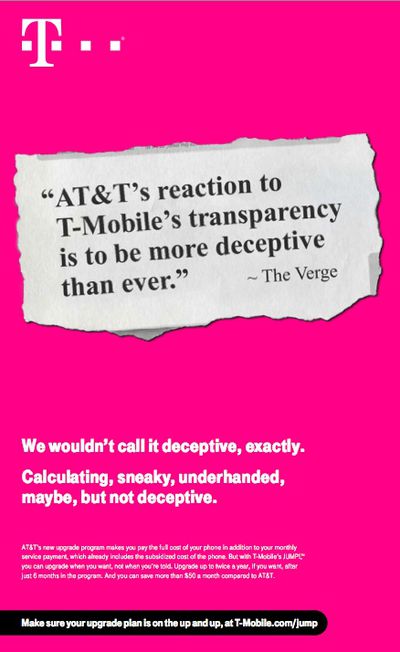Following the introduction of T-Mobile's "Jump" and AT&T's "Next" early upgrade programs, T-Mobile has launched a new anti-AT&T ad campaign that calls the company's Next policies "calculating, sneaky, and underhanded," reports AllThingsD.
First introduced last week, Next is AT&T's answer to Jump, a T-Mobile program that allows users to upgrade their phones at regular intervals with a $10 monthly fee. Like Jump, Next provides AT&T users with an option to upgrade their phones more frequently, but its $32.50 monthly charge is on top of standard monthly fees, ultimately causing customers to pay double for their devices.
A comparison of the two plans reveals that a T-Mobile customer using Jump would pay $518 for a 16 GB iPhone 5 over the course of a year while a customer using Next would pay $630, a premium of $112. With both plans, customers have to trade in existing devices and pay the monthly fees in order to obtain an upgrade.
T-Mobile CEO John Legere has been vocal about AT&T Next since its debut, releasing a number of tweets condemning the program. The company's newest ad includes a quote from The Verge that Legere highlighted last week: "AT&T's reaction to T-Mobile's transparency is to be more deceptive than ever."

Verizon has also introduced an upgrade program called "Edge," which shares similarities with AT&T's Next program. A 16 GB iPhone 5 costs $565 on the plan. According to T-Mobile marketing chief Mike Sievert, Verizon will be targeted in ads set to run later this week.
"There are real and material differences between what we are doing and the so-called upgrade programs that AT&T and Verizon are doing," he said.
T-Mobile and AT&T have an ongoing feud that originally began in 2011 after AT&T was unable to purchase the T-Mobile network due to objections from the Federal Communications Commission and the Department of Justice.
Tensions ramped up in January after Legere called the AT&T network "crap," leading to an advertising war between the two companies as T-Mobile unveiled its "Un-Carrier" policies, designed to decouple device fees from service fees.























